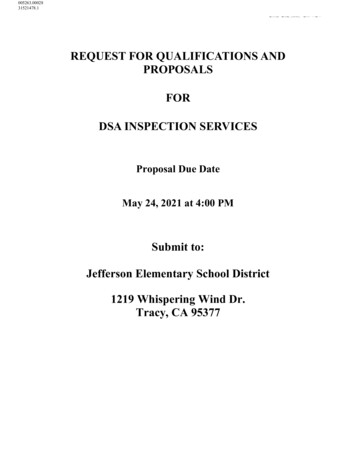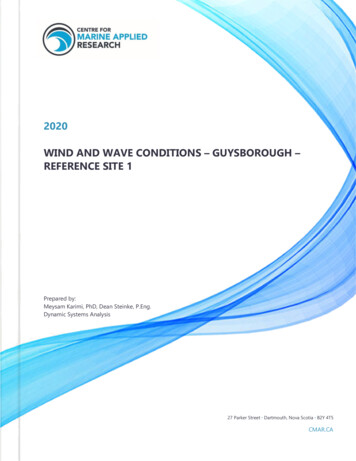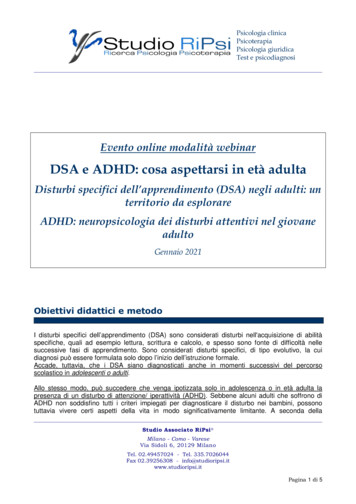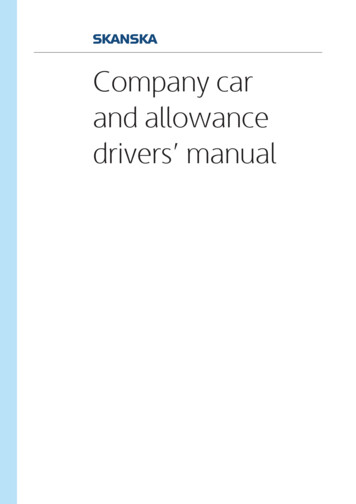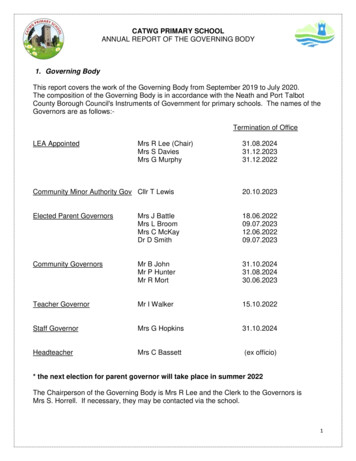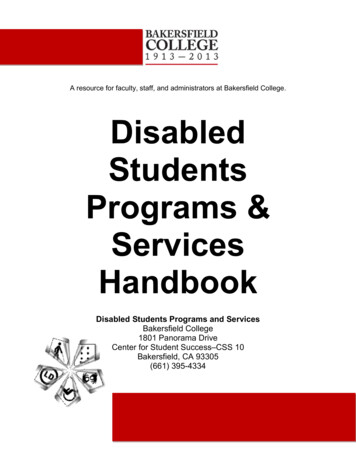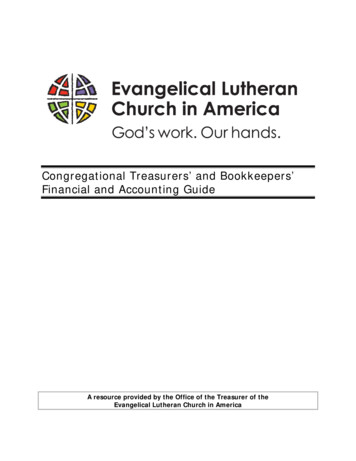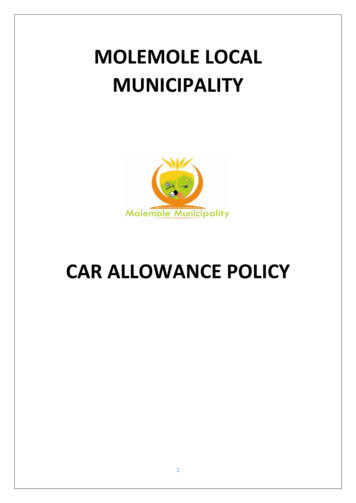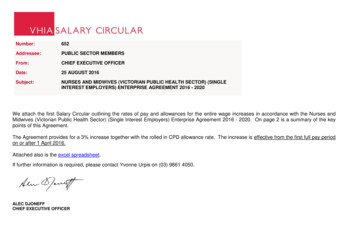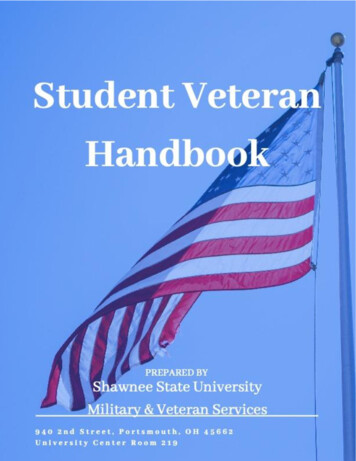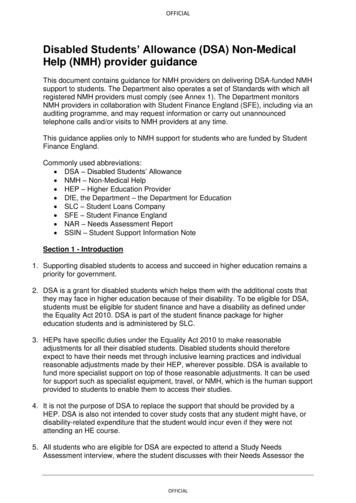
Transcription
OFFICIALDisabled Students’ Allowance (DSA) Non-MedicalHelp (NMH) provider guidanceThis document contains guidance for NMH providers on delivering DSA-funded NMHsupport to students. The Department also operates a set of Standards with which allregistered NMH providers must comply (see Annex 1). The Department monitorsNMH providers in collaboration with Student Finance England (SFE), including via anauditing programme, and may request information or carry out unannouncedtelephone calls and/or visits to NMH providers at any time.This guidance applies only to NMH support for students who are funded by StudentFinance England.Commonly used abbreviations: DSA – Disabled Students’ Allowance NMH – Non-Medical Help HEP – Higher Education Provider DfE, the Department – the Department for Education SLC – Student Loans Company SFE – Student Finance England NAR – Needs Assessment Report SSIN – Student Support Information NoteSection 1 - Introduction1. Supporting disabled students to access and succeed in higher education remains apriority for government.2. DSA is a grant for disabled students which helps them with the additional costs thatthey may face in higher education because of their disability. To be eligible for DSA,students must be eligible for student finance and have a disability as defined underthe Equality Act 2010. DSA is part of the student finance package for highereducation students and is administered by SLC.3. HEPs have specific duties under the Equality Act 2010 to make reasonableadjustments for all their disabled students. Disabled students should thereforeexpect to have their needs met through inclusive learning practices and individualreasonable adjustments made by their HEP, wherever possible. DSA is available tofund more specialist support on top of those reasonable adjustments. It can be usedfor support such as specialist equipment, travel, or NMH, which is the human supportprovided to students to enable them to access their studies.4. It is not the purpose of DSA to replace the support that should be provided by aHEP. DSA is also not intended to cover study costs that any student might have, ordisability-related expenditure that the student would incur even if they were notattending an HE course.5. All students who are eligible for DSA are expected to attend a Study NeedsAssessment interview, where the student discusses with their Needs Assessor theOFFICIAL
OFFICIALtype and level of support required for them to undertake their chosen course ofstudy. The report produced as a result of that discussion is the NAR, which is thebasis of any DSA support provided. When completed and agreed the NAR is sent toSFE for approval.Section 2 – what NMH is for and what can be providedWhat is Non-Medical Help?6. NMH is the human support provided to students to enable them to access theirstudies. This includes support such as British Sign Language (BSL) interpretation,specialist study skills and strategy support for students with specific learningdifficulties (SpLDs) or autism spectrum conditions (ASC), and specialist mentorsupport for students with ASC or mental health difficulties. A full description of thevarious NMH roles is available in section 4.15 of the main DSA guidance 122-dsa-guidance.pdf. Thatguidance also provides the cost bands associated with each role and specifies whichare eligible for DSA funding.7. It is the role of a student’s HEP to provide any academic support the student mightrequire, and this includes providing course materials in an accessible format. DSAfunded NMH support providers must therefore avoid providing support to a studentwhich is not directly linked to enabling a student to access the teaching and learningprovided by the HEP, or which is: the responsibility of the HEP, and/or outside of the DSA-funded role(s) they are providing.NMH roles that are available for DSA funding8. NMH roles fall into 4 bands: band 1 roles are the least specialist roles and band 4roles the most specialist. However, it should be noted that it is generally only band 3and 4 roles that are fundable by DSA. This is because DfE considers that thesupport provided through bands 1 and 2 is generally that which could be expected tobe provided by a student’s HEP as a reasonable adjustment under the Equality Act.Which roles are – and are not – fundable by DSA is given with the description ofeach role in section 4.15 of the DSA guidance 122-dsa-guidance.pdf.Providing quotes for support9. When a Needs Assessor is preparing a student’s NAR, they may contact an NMHprovider to ask for a quote. You should respond promptly when you are contactedby a needs assessor to provide a quote for support to ensure that there is no delay insubmitting the student’s report to SFE. Needs Assessors are required to providequotes to SFE in a standard format, so it may be good practice to use this sameformat to provide a quote for your services, or to provide the information required in asimilar format. For information, the NAR template and guidance can be found hereExchange blog - SFE, Practitioners (slc.co.uk) and pay bands for NMH support canbe found in section 4.15 at 2-dsaguidance.pdf.2OFFICIAL
OFFICIAL10. NMH providers should only quote for work where they are confident that they havethe capacity to deliver that role and should not provide a speculative quote in thehope that they will be able to engage or recruit suitable staff. It is not acceptable forstudents to be in the position of seeking to engage support that is not available, orfor the provider to withdraw from providing support at short notice: both occurrencescan mean students are left without support in place when they need it, which is asignificant issue for the students concerned.11. If a provider cannot put support in place within 14 days of the student contactingthem the student should be referred back to SFE.Section 3 – providing support to studentsWork plans and delivering support12. It is good practice to agree a work plan with the student so that students understandthe support that will be provided. NMH providers must ensure that any NMH supportprovided is delivered in a manner that has been agreed with the student, which suitstheir learning needs, and which is compatible with the pedagogy of the student’scourse and programme of study.13. DSA funds are paid for specific support only: recommendations and advice on othertopics should not be provided to the student in DSA-funded time. This ensures thatthe student receives the full benefit of the support provided in the session invoicedfor and therefore the taxpayer also receives value for money. The support deliveredmust be in line with the role parameters as set out in section 4.15 of the guidancechapter at 2-dsa-guidance.pdf.Venues for delivering NMH support14. NMH support can be delivered remotely, but the decision on whether to receiveremote, face to face or a blended approach1 to their support must be the student’s.Where face to face support takes place, any sessions must be provided in a spacewhere confidentiality can be maintained. Clearly, public places (coffee shops,restaurants, canteens, etc.) cannot provide the confidentiality required to deliverNMH support. This applies whether or not the venue is requested by the student asit is not appropriate to deliver support in this way.15. The venue for support should be a room that is accessible to the student, with a doorthat closes and with some form of emergency notification – either a dedicated panicbutton or a phone alert. The room should be available solely for the use of thestudent and the support worker for the whole of the support session. It should alsoaccommodate any additional person the student may wish to accompany them, forexample a parent, carer, or friend.1Blended support is a mixture of remote and face to face support.3OFFICIAL
OFFICIAL16. There is no requirement for HEPs to provide accommodation for NMH provision, butmany HEPs do allow students to book rooms for learning-related activity. Somestudents will wish to hold their NMH session within their HEP and, where a studentwishes to do so, we would recommend that HEPs allow a student to access roomsfor DSA purposes on the same basis as any other learning-related meeting. Asindependent and autonomous bodies it is of course a matter for HEPs to controlaccess to their premises. However, we recommend that arrangements should be inplace to allow DSA-funded NMH support workers to deliver support in the same wayas other contractors, via temporary passes, arranging for the student concerned to‘sign in’ the provider, etc.17. Additionally, and where face to face support is provided (particularly in a student’shome), all NMH providers should have a lone working policy in place and shouldensure that risks for both the student and support worker are appropriately assessedbefore providing support.Professional boundaries18. Students in receipt of DSA-funded NMH support should be treated with dignity andrespect and have their confidentiality maintained. All NMH providers receiving DSAfunding for providing these services must ensure that these expectations are upheldand that the support they are providing is being delivered within professionalboundaries.Complaints19. All providers should have a suitable complaints procedure in place.Insurance20. It is a requirement for all DSA-funded NMH providers to hold 5m public liabilityinsurance, 5m employer’s liability insurance, and 1m professional indemnityinsurance. This will be checked on audit or by the Department at any time.21. Sole traders who are not required to hold employer’s liability insurance will not beexpected to provide evidence of this type of insurance at audit. However, other thanthat, the same insurance requirements apply to all NMH providers.22. Required insurances must always be kept up to date.Booking sessions, and cancelled or missed sessions23. As a matter of course all sessions, including the first, must be booked and confirmedwith the student, and this should be done using the student’s preferred method ofcommunicating. After the initial session, sessions can be booked either in a block(i.e., at specific times for a number of weeks ahead) or one session at a time.24. There will be occasions where sessions will be cancelled, either by the NMHprovider or the student. As a matter of good practice NMH providers should makeany students they support aware of their cancellation procedures. Details of the4OFFICIAL
OFFICIALDepartment’s cancellation policy, including the actions that need to be taken in thecase of a missed or cancelled session, can be found in section 4.13 of the main DSAguidance chapter at 2-dsaguidance.pdf.25. There will also be incidences where a support worker does not have the capacity toprovide ongoing support (for example sickness). Where the provider is not able toprovide an alternative qualified worker, the student should be referred to SFE toarrange an alternative provider as soon as it is known that support is not available.Session length26. NMH agreements on a DSA2 letter will specify a number of hours agreed for eachrole. In general, it is presumed that most booked sessions of specialist support wouldbe an hour in length. Some support will be dictated by the length of a student’slecture e.g. Specialist Notetaking Support.27. Where sessions either finish earlier than planned or run over, time can be claimed inin periods of 15-minute blocks. This is the minimum time period that should beinvoiced for in order for SLC to accurately track and monitor used and remaininghours.Timesheets and invoicing for support delivered28. If providers are allocated DSA-funded work, DSA funding will only be paid for thetype of support, and the number of hours of support, that have been approved bySFE and delivered to the student. This is specified on the DSA2 letter the studentreceives from SFE confirming their entitlement, and as these are not issued toproviders the student will need to be asked to share this.29. It is good practice for providers to track the number of hours of agreed support that astudent is using and to inform the student when they are nearing their total. This willallow the student to contact their Needs Assessor to arrange any increase in hours(if appropriate) in good time. Additional hours will need to be approved by SFEbefore they can be taken.30. It is the provider’s responsibility to invoice SFE for any DSA-funded supportundertaken. Full details on the action you need to take when you have deliveredsupport are available from SLC on dsa requests@slc.co.uk, but particular noteshould be made that: a standard timesheet must be completed for each session provided (morethan one session can be entered on to the timesheet), both the student and the person providing the support must sign the timesheetto confirm that the details are correct, and timesheets for all sessions claimed for must be included with invoices to SFEfor payment.31. Timesheets must not be signed prior to a session taking place by either the studentor support worker.5OFFICIAL
OFFICIALInformation for students32. Information for students on what they can expect from their NMH provision can befound at: Exchange blog - SFE, Practitioners (slc.co.uk). We would recommendsharing this document with your students.Section 4 - assuring the quality of NMH provision33. Information on the auditing and quality assurance arrangements for NMH provisioncan be found at Guidance for NMH Suppliers (slc.co.uk). These arrangementsinclude the Department’s auditing programme, the conflict of interest procedures,and SFE’s financial controls.Registering to provide support34. As mentioned above all DSA-funded providers are required to register to provideNMH support. The registration process is straightforward and full details are providedin the section ‘Registering as a new NMH supplier’ s/. There is no charge for registering.35. When registering, all providers agree to a set of Standards (attached at Annex 1).These are applicable to all NMH providers both new and existing.36. NMH providers can market their services, but this must be done appropriately andresponsibly. All providers should note that registering as an NMH provider for DSAfunded support is not an accreditation process, and those registered should notadvertise themselves as having been accredited by DfE, SFE or SLC. Providersmust also be careful to ensure that any advertising channels do not includemisleading or incorrect information.37. You should note that being registered as an NMH provider does not guarantee thatyou will be allocated DSA-funded work.38. Where a support worker stops working for one NMH provider but continuesproviding DSA-funded support, either in their own right or through another NMHprovider, the students who are being supported by that worker should be offered thechoice of staying with that support worker at their new provider or staying with theircurrent NMH provider and being allocated to another support worker. This should bea genuine and free choice for the student. There is no automatic right for the NMHprovider to retain students in these circumstances, nor for the support worker to takethe students to their new NMH provider or NMH sole trader business. If a studentwishes to move with a support worker then SFE should be contacted with a requestfor the change. The proposed change cannot take place unless and until this isapproved by SFE.Mandatory qualifications or professional body memberships for NMH roles39. There are mandatory qualification or professional body membership requirements formost DSA-funded NMH roles. The full detail of these is given at:6OFFICIAL
OFFICIALnmh mandatory qualifications and professional body membership requirements.pdf (slc.co.uk) .40. It is the responsibility of people undertaking these roles, and of those recruiting them,to: ensure that anyone looking to provide these roles for DSA-funded studentsmeets these mandatory requirements. keep copies of any qualifications or professional body memberships. ensure that any professional body memberships required are kept up to date(i.e., they must be renewed in good time and without a break in membership). ensure that professional body membership levels are those listed on thematrix. If a membership card or register entry does not show the required levelof membership then further confirmation and evidence should be sought toconfirm this. Ensure when taking on new staff that the levels of qualifications ormemberships are those required for the role. A provider should not rely onreferences etc. from previous provider but should check the qualificationscertificates and professional body membership(s) themselves and retain acopy on file.41. Should a support worker leave their role, NMH providers must retain theirqualification and/or professional body membership records for a minimum of 12months after their date of leaving for DfE audit purposes.42. Where those engaging or taking on staff are unsure about what level a qualificationis, reference can be made to the guidance at els-mean/list-of-qualification-levels. If a worker is found at audit tohave incorrect qualifications or membership, they may be deemed unqualified andsanctions applied in line with the Department’s Standards.43. Teaching Qualifications: There are many different types of teachers, and so thereare many different types of teaching degrees. Many qualifications confer qualifiedteacher status and the list on the Mandatory Criteria and Professional BodyMembership matrix is not exhaustive. The following link may be helpful whenchecking the teaching status of those applying to deliver DSA-funded roles wherethis is a requirement Teacher status checks: information for employers - GOV.UK(www.gov.uk)44. NMH providers should be particularly careful to provide the appropriate support inthe following categories, as separate qualification/membership requirements apply toseparate roles: Specialist Mentors – there are different requirements for students with autismspectrum conditions, and for students with mental health difficulties. Specialist 1-1 Study Skills Support Workers – there are different requirementsfor students with autism spectrum conditions, and for students with mentalhealth difficulties. Specialist Notetakers – there are different requirements for students who arevisually impaired, and for students who are hearing impaired.7OFFICIAL
OFFICIAL45. NMH providers’ accredited and DfE-approved in-house training courses areacceptable elements of qualifications for the following roles: Specialist Notetaker for Deaf/Hard of Hearing students - Includes ElectronicNote Taking. Specialist Notetaker for Visually Impaired (VI) students - including Braille. Specialist Mentor - Autism Spectrum Conditions (ASC). Specialist one-to-one Study Skills and Strategy Support - Autism SpectrumConditions (ASC).46. If your organisation has developed relevant accredited NMH in-house training or anew stand-alone training course specifically for those delivering support to DSAfunded students, this will require approval from DfE prior to delivery if it is designedto meet a qualifications requirement on the matrix. Please contactDisabled.STUDENTALLOWANCES@education.gov.uk for further information aboutDfE requirements and the approvals process. Current qualifications requirementscan be found here:nmh mandatory qualifications and professional body membership requirements.pdf (slc.co.uk).47. By “relevant”, DfE means that the training is specific to the disability it is intended tosupport and includes content on supporting students in higher education.48. In DfE’s view, in-house and stand-alone training should be formally accredited inorder to have assurance that the training is of the right quality and is evidenced by acertificate of completion. Formal accreditation provides assurance that anorganisation or person is competent to perform specific processes, activities or tasksin a reliable, credible and accurate manner. This could be demonstrated if theorganisation providing the training is externally accredited to provide training in therelevant subject area, e.g. accredited by CPDUK (https://cpdpk.co.uk), CPDStandards Office (https://www.cpdstandards.com/) or similar, or is a HE institutionwith degree awarding powers.49. Relevant training that is delivered by an awarding body that is quality assured (e.g.by the QAA – the Quality Assurance Agency for Higher Education) and results in acertificate of completion is also acceptable.50. All training should be delivered by an appropriately qualified trainer (a qualifiedtrainer from a recognised organisation/charity, or a trainer who can demonstrate arelevant qualification), and result in a certificate of attendance.51. If you are aware of any relevant qualifications or training for any DSA-funded supportworker roles that are not included in the mandatory qualifications matrix pleaseforward details to Disabled.STUDENTALLOWANCES@education.gov.uk forconsideration.52. People who do not meet the Department’s qualification requirements are not allowedto deliver DSA-funded support. Given that, it is not possible for those who are‘working towards’ a qualification to provide DSA-funded support and, similarly, it isnot possible for those who have experience without qualifications to provide DSAfunded support. It might be helpful to explain that, in the first example, many8OFFICIAL
OFFICIALqualifications or professional body memberships have a criterion for academicachievement as well as a minimum amount of observed practice. A person mayhave achieved the required academic standard but may not yet have the observedpractice, and so will not have the knowledge of using their particular speciality in reallife situations. In the latter example, there is not a way of confirming or auditing aperson’s stated experience.53. At the time mandatory qualifications were introduced in April 2016 it was decided toallow support workers who were already delivering NMH services to existingstudents to continue to do so until the end of the student’s current course without theneed for the support worker to meet the new qualification requirements. In addition,where students continue from an undergraduate course to a postgraduate coursewithout a break and continue at the same HEP, their current NMH support workercan continue to provide support even if they remain unqualified in line with DfE’smandatory qualification matrix. The numbers still doing so will now be very low.These unqualified workers must not have taken on any new students after April 2016and cannot in any circumstances support new students without updating theirqualifications or professional memberships in line with the most recent version of thematrix.54. When the revised NMH DfE qualification and professional body membershiprequirements matrix was issued in June 2019 there were exemptions for thoseexisting support workers who met the previous standards but not the revisedstandards; in that respect there was no requirement for requalification. Those whofulfilled the existing qualification or membership requirements of the 2016 matrixwere able to continue providing support in that role to DSA-funded students andwere not required to ‘re-qualify’. However, please note that:i.Existing support workers who met the requirements of the 2016 version ofthe matrix (Version 2.8) and were not qualified to the revised 2019standard, and who wish to change agency or employer in the future whilstundertaking their existing role, need to ensure that they have sufficientproof of being employed in their current role, with their existingqualifications, to satisfy both their new agency or employer and any DfEaudit requirements. This means they will need to ensure that they havedocumentary proof of personally delivering DSA-funded support prior toJune 2019, for example a wage slip with details of the role or an outgoingworkplace reference.ii.Existing support workers who wish to undertake a new or additional rolemust meet the ‘new’ 2019 qualification requirement for their intended role.For example, they may currently deliver one-to-one specialist supportwithin the 2016 matrix requirements and want in future to deliver supportfor a different role. From June 2019 they have been required to meet thequalifications or membership as defined in the new matrix (dated June2019) for that new additional role.9OFFICIAL
OFFICIALAuditing and Quality Assurance Arrangements55. The document at the following link sets out details of the auditing and qualityassurance arrangements for non-medical help (NMH) providers who deliver DSAfunded support. These arrangements are intended to provide assurance that publicfunds are being spent appropriately and ments april-2021 updated.pdf56. Information regarding how we treat the information used for auditing DSA-fundedNMH support workers can be found in the document ‘Privacy Notice: Auditing ofQualifications of Non-Medical Help Support Workers funded through DisabledStudents’ Allowances’, which can be found at the following 5/privacy notice nmh auditing august2020.pdf.Conflict of interest process57. All DSA-funded providers are expected to identify and manage any potential conflictsof interest. Full information on what constitutes a conflict of interest, and how tomanage any that are identified, is provided in guidance at: final-conflicts-of-interestguidance october-2021.pdf (slc.co.uk)58. All providers are expected to maintain a conflict of interest register, to notify theDepartment of any material changes to this, and to complete and return a conflict ofinterest return when requested to do so.Section 5 - Other informationProviding feedback59. It is good practice that students are provided with a means of giving feedback on thesupport they are receiving. How to do so is a matter for individual providers todecide, but this can be through formal or informal methods.60. The Department also encourages all NMH providers to contact a student’s HEPdisability advisor or team: this is to provide feedback on a student’s DSA-fundedsupport and to ensure as far as possible that support is integrated with any supportprovided by the HEP. However, as some students do not disclose their disability totheir HEP a student’s permission to make contact with their HEP to discusstheir support must always be sought, in writing if that is appropriate and a recordkept.Background checks on people providing NMH support61. It is for individual providers to satisfy themselves that DSA NMH support workers aresuitable for the roles they wish to deliver. The Department’s view on whether it isnecessary or appropriate for those delivering DSA-funded NMH support to beDisclosure and Barring Service (DBS) checked is contained in SSIN 05/18, which isavailable at:10OFFICIAL
1672/ssin dsa 18 10 2018 disclosure and barring service checks for non-medical help provision.pdf.CPD requirements and support worker training62. It is the responsibility of NMH providers to ensure that any CPD requirements forspecific DSA-funded roles are checked on an annual basis: this may be checked ataudit or on spot checks. Additionally, it is good practice to ensure support workershave undertaken appropriate training in confidentiality, data protection, health andsafety, lone working, safeguarding and disability awareness. Where providers do notdirectly employ or engage staff, such as freelance support workers, it remains goodpractice to ensure any support workers they provide for DSA-funded NMH work havea similar level of training: this will ensure that staff understand the Department’s andthe provider’s policies on these issues.Sharing data63. There is a requirement for all providers to share information or data; this may be, forexample, sharing a student’s personal information with SFE or with the student’sNeeds Assessor, or sharing a worker’s data or information on qualifications with DfEduring audit. NMH providers must therefore ensure that appropriate arrangementsare in place to enable this data sharing to take place.64. NMH providers who are new to DSA will receive a Data Sharing Agreement fromSFE following their first payment for DSA services. This will be sent directly fromSFE and will contain information and instructions on how to complete and return this.Disabled Students’ Allowances Team,Higher & Further Education,Department for Education,Sanctuary Buildings,Great Smith Street,London, SW1P 3BT11OFFICIAL
OFFICIALAnnex 1 - Membership Standards for NMH Providers1. This document sets out the membership standards (Standards) with which allProviders on the register of non-medical help (NMH) providers for DisabledStudents’ Allowance (DSA) (Register) must comply.Background2. The Register is managed and owned by the Department for Education (DfE). It ishosted on the Student Finance England webpage for NMH Providers at Guidancefor NMH Suppliers (slc.co.uk). It is also hosted, for reference, on the StudentFinance England webpage for assessment centres at Exchange blog - SFE,Practitioners (slc.co.uk).3. Providers must be on the Register in order to deliver DSA-funded NMH support.4. Entry on the Register does not guarantee that Providers will be asked to quote for,or receive, DSA-funded NMH work and it is not an accreditation proces
Help (NMH) provider guidance This document contains guidance for NMH providers on delivering DSA-funded NMH support to students. The Department also operates a set of Standards with which all registered NMH providers must comply (see Annex 1). The Department monitors NMH providers in collaboration with Student Finance England (SFE), including .
